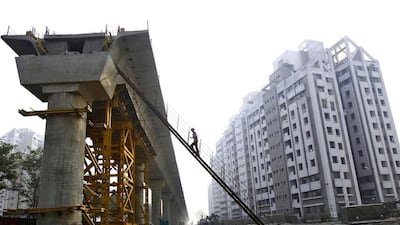The US$75 billion infrastructure deal agreed between the UAE and India this week has been welcomed by construction industry chiefs who believe it could have a transformative effect on the country despite the challenges there.
On Monday, plans were announced to invest in Indian infrastructure and boost trade between the countries by 60 per cent after the two-day visit to the UAE by the prime minister, Narendra Modi.
“We welcome the agreement and the positive impact it will have in supporting major infrastructure development in India,” said Rajesh Kalra, managing director for India at the building consultancy Atkins. “Investment of this magnitude is much needed and will ultimately improve the prospects and living standards for millions of people.”
Ajay Rajendran, vice-chairman of Sobha Developers, which has created master developments in India and Dubai, said that India had a variety of infrastructure needs.
“It needs consistent electricity, roads and bridges, metro lines – many things.”
David Barwell, the chief executive of Aecom in the Middle East and India, said there was a need for ports, airports, freight and passenger rail and “thousands of kilometres of road networks” to ease the movement of goods and people around the country.
“The government has launched a new national programme ‘Make in India’ designed to facilitate investment in best-in-class infrastructure,” he said.
“Priorities under this programme include improving industrial corridors and developing smart cities, developing and upgrading port facilities and enhancing power capacity.”
Electricity is a key concern, with annual power losses estimated at about 24 per cent of capacity. This is blamed on several factors including shortages of coal stocks and inefficiencies in the power grid infrastructure and distribution network.
The government has been attempting to resolve this by removing some environmental and planning restrictions, according to BMI Research, which is forecasting growth in the power sector of 6.5 per cent a year as a result.
Overall infrastructure growth is predicted to be about 5 per cent a year, BMI Research stated. Its figures state that infrastructure spending was about $600bn last year and is set to climb to $649bn this year and to $1 trillion by 2020.
Yet although the need is there, the funds are not.
India is predicted to run a fiscal deficit of 3.9 per cent in the current fiscal year, and although Mr Modi’s government is generally seen as likely to improve public finances, they remain weak in the near-term.
The recent decline in value of the Indian rupee also makes purchases of equipment and raw materials for projects more expensive.
Mr Kalra argued that “living standards in cities of all sizes are fast deteriorating due to crumbling infrastructure, but city-level projects are not easily bankable”.
This is where an infrastructure fund becomes useful, by offering longer-term sources of finance for projects that can then offer returns for investors from ongoing revenue sources – sales of metro tickets, for example, or tolls for new roads.
Christopher Seymour, Middle East head of markets at Arcadis, said the bilateral agreement between India and the UAE “will create an investment fund that will address that need, including 500 train stations and 15 million homes”.
“This should be considered the tip of the iceberg, and with a less-sophisticated procurement base for construction, plus the logistical problems created by the geographic scale and [India’s] weather, the question of how to achieve good value from the investment will need to be answered.”
Indeed, for those funding or even delivering projects, India presents challenges.
High levels of bureaucracy is one, and corruption is another.
This week, a judge in Goa turned down an application for bail from Goa’s former public works minister, who was in charge when the construction consultancy Louis Berger allegedly paid bribes to win a water and sewerage pipeline project. Louis Berger paid a settlement to the US justice department last month in a case that involved payments to public officials in India, South East Asia and the Middle East.
Mr Barwell said that a drive to stamp out corruption by Mr Modi’s government was “an important step in encouraging new companies into the market”.
mfahy@thenational.ae
Follow The National's Business section on Twitter


